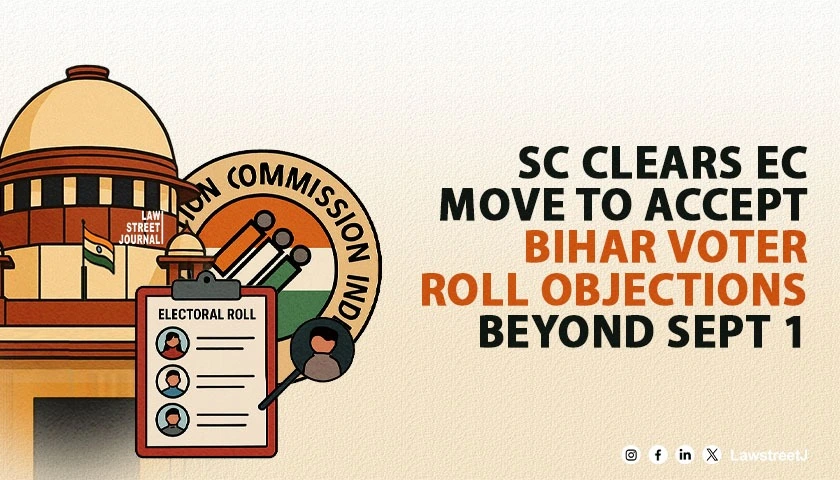NEW DELHI: The Supreme Court on Monday approved the Election Commission's decision to accept claims or objections in preparation of the draft electoral rolls in Bihar even after the September 1 deadline during the Special Intensive Revision process initiated in June, ahead of Assembly elections later this year.
A bench of Justices Surya Kant and Joymalya Bagchi noted the submission by the poll panel that all such claims or objections filed before the last date of nominations will be considered.
Applications were filed by Bihar opposition parties, RJD and AIMIM to extend the deadline of filing claims and objections by two weeks.
The Election Commission said that claims or objections can be submitted even after the deadline of September 1 and that those will be considered after the electoral roll has been finalised.
Senior advocate Rakesh Dwivedi, for the poll panel, assured that the process would continue until the last date of nominations and all inclusions or exclusions will be integrated in the final roll.
Terming the confusion over Bihar-SIR as largely a trust issue, the court directed for deployment of para-legal volunteers in rendering to individuals in filing objections.
The bench also asked the political parties to activate themselves in the process.
Dwivedi said 99.5% out of 7.24 crores voters have filed their forms.
Out of the 65 lakhs voters excluded from the draft, only 33,326
individuals and 25 claims through parties have been submitted for inclusion after the order of the apex court on August 22.
He said that 1,34,738 objections have been filed for exclusion.
The counsel said it was strange that the political parties are filing objections seeking deletion of voters from the draft list and not any claims for inclusion.
On August 22, the court had ordered that the persons who are excluded from the draft electoral roll during the Special Intensive Revision (SIR) in poll-bound Bihar can submit their applications for inclusion through online mode and that physical submission of forms is not necessary.
It had said that individual person at their own or with assistance of booth-level agents (BLAs) of political are entitled to apply online and not necessary to submit application in physical form. The court had earlier also allowed use of Aadhaar card for the purpose.
The bench had said all 12 political parties in Bihar shall issue specific directions to party workers to assist in people in filing and submission of requisite forms with any 11 documents in form 6 or Aadhaar Card to get themselves included in the voters list.
It had said BLAs of all political parties are directed to make endeavour that approximately 65 lakh persons not included in the draft rolls are facilitated, except those who are dead or have voluntarily migrated, in submitting their objections by cutoff date of September 1.
In a batch of petitions challenging the move to conduct SIR of electoral rolls in Bihar, the Election Commission had also filed an affidavit saying the list of names and details of 65 lakh electors in Bihar who were not included in the draft roll published on August 1 had been posted on the websites of all 38 District Electoral Officers in the state.
The list also contained the reasons for their non-inclusion, including death, shifting of ordinary residence or duplicate entries, ECI had told the apex court.
ECI had filed affidavit in compliance of August 14 directions of the Supreme Court directing it to publish an enumerated, booth-wise list of approximately 65 lakh electors not included in the draft electoral roll during the ongoing SIR exercise in poll-bound Bihar.
The petitions challenging the ECI decision were filed by RJD MP Manoj Jha, the Association for Democratic Reforms (ADR), PUCL, activist Yogendra Yadav, Trinamool MP Mahua Moitra, and former Bihar MLA Mujahid Alam.
The pleas sought direction to quash the ECI’s June 24 directive that requires large sections of voters in Bihar to submit proof of citizenship to remain on the electoral rolls.
The petitions also raised concerns over the exclusion of widely held documents like Aadhaar and ration cards, stating that this would disproportionately affect the poor and marginalised voters, especially in rural Bihar.
Disclaimer: This content is produced and published by LawStreet Journal Media for informational purposes only and does not constitute legal advice. The views expressed are independent of any legal practice of the individuals involved.















